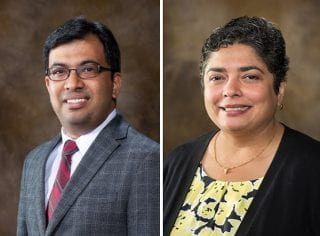Department of Defense Funds Development of ‘Heart-on-Chip’ System for Mitochondrial Diseases

Kartik Balachandran, associate professor of biomedical engineering, and Shilpa Iyer, assistant professor of biological sciences.
A two-year, $300,000 Department of Defense Discovery Award will enable an interdisciplinary research team to integrate patient-specific cardiac cells on a chip that could lead to testing of therapeutic drugs for treating mitochondrial diseases.
Mitochondrial diseases arise as a result of defects in mitochondria, which are the energy powerhouses of cells. Mitochondrial disease is difficult to diagnose because it affects each individual differently. There are no cures for mitochondrial diseases, and current treatments only improve symptoms. There are also no effective benchtop models for the development and testing of drugs.
Mitochondrial diseases especially impact the heart, because cardiac muscles demand high energy to function. The most frequent manifestation of this pathology is cardiomyopathy, a dysfunction in which the heart muscle struggles to pump blood to the rest of the body.
To address these issues, Kartik Balachandran, associate professor of biomedical engineering, and Shilpa Iyer, assistant professor of biological sciences, have teamed up to develop an in vitro testing platform that mimics a beating heart and its related chemical and electrical signaling. The system will use reprogrammed stem cell-derived heart muscle cells, known as cardiomyocytes, from patients with mitochondrial diseases. The chips will then be used to test the safety and effectiveness of drugs to improve impaired heart function in mitochondrial disorders.
Iyer and her team conduct research on mitochondrial diseases and have received grants from the Arkansas Biosciences Institute, the National Institutes of Health and the Department of Defense. Her team has obtained skin cells from mitochondrial patients and team members are creating disease-specific stem cells. Her research group is focused on understanding the role of bioenergetics and mitochondrial genetics in normal and diseased skin, nerve and muscle cells, key cell types that are affected in mitochondrial diseases.
Balachandran has received funding from the Arkansas Biosciences Institute and the National Science Foundation to design and engineer organ-chip systems to study the role of mechanical forces on physiology, function and disease.
The researchers are partnering with Franklin West, associate professor at the University of Georgia Regenerative Bioscience Center; an expert in stem cell biology and regenerative therapies.
The research could lead to the development of therapeutic testing for military personnel who suffer from metabolic and energy deficiencies, and their dependents who suffer from mitochondrial diseases, researchers said. Balachandran said the research could be easily extended to other organs, such as the brain, blood-brain barrier, lung, nasal airways, spinal cord and eyes.
More information on Balachandran’s research can be found at the Mechanobiology and Soft Materials Laboratory website.
More information on Iyer’s research can be found at the Laboratory of Cellular Energetics and Mitochondrial Disorders website.
A version of this story also appeared in the U of A’s Newswire publication.
Nick DeMoss
479-575-5697 // ndemoss@uark.edu

